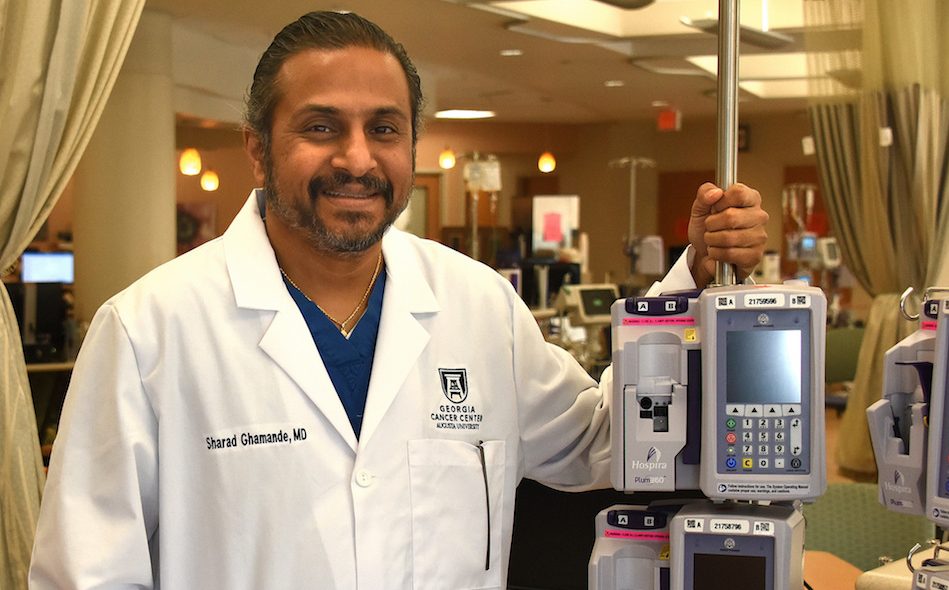Cervical cancer is often deadly when it recurs and physician scientists want to know if a new therapeutic vaccine can prevent or reduce recurrence in women at high risk for its return.
The vaccine is being studied in patients at high risk because of evidence that cancer cells have spread to lymph nodes in their pelvis or because their disease was diagnosed in the later stages the first time. It’s believed to evoke an immune response that enables the woman’s own body to better stave off the disease.
“When cervical cancer comes back, standard treatments often fail,” said Dr. Sharad A. Ghamande, chief of the Section of Gynecologic Oncology at the Medical College of Georgia and associate director for clinical research at the Georgia Cancer Center at Augusta University.
“Wouldn’t it be wonderful if we could prevent it from recurring?”
The therapeutic or treatment vaccine Axalimogene Filolisbac, which is given intravenously, makes use of the ability of the Listeria bacteria to infect cells. In this case, the weakened version of the typically food-borne bacterium won’t make patients sick, rather has the additional benefit of further rousing the attention of the immune system and quietening the tumor’s ability to defend itself, Ghamande said.
Once taken up by antigen-presenting cells, which help focus the immune system on an invader, the vaccine releases a factor that heightens their attention specifically to the cancer-promoting protein E7, a so-called oncoprotein that not only enables the human papillomavirus to multiply, but potentially cervical cancer cells to do the same. E7, along with the viral protein E6, are consistently expressed in tumors.
Infection with the sexually transmitted HPV is the most common cause of cervical cancer. HPV-16 and 18 cause about 70 percent of cervical cancers worldwide and the Food and Drug Administration has approved vaccines to prevent infection with these two strains. The new phase three study of the cervical cancer vaccine is needed for the FDA to consider approving it for more widespread use, said Ghamande, a principal investigator on the trial.
Study participants will get the vaccine every three weeks for the first three months, then a dose every eight weeks until they have received five additional doses or until the disease recurs. Two thirds of patients will receive the vaccine and the remainder a placebo. About 450 participants are being enrolled worldwide who will be followed for three to five years. Study participants must have completed a course of the current standard of care. The most common side effects of the vaccine are fever and other flu-like symptoms.
MCG/AU Health was the only site for the phase 1 trial to test the vaccine’s safety and look at tumor response in patients with persistent, recurrent and/or metastatic disease. A phase 2 study of the therapeutic vaccine is currently underway in other centers in patients with recurrent disease to see if it can help extend 12-month survival. Early results indicate it can essentially double average survival time for those patients, Ghamande said.
“The phase 2 study has provided some early evidence that patients with recurrent disease who get the vaccine may be stable for a long period,” Ghamande said. “For this new trial, we are looking at patients not progressing to recurrent disease.” Doses in the phase 1 trial were five to 10 times higher than those being given in the current trial.
The American Cancer Society estimates that about 12,900 cases of invasive cervical cancer are diagnosed in the United States annually, and about 4,100 women die from the disease. Classic symptoms include unexplained bleeding, such as bleeding when you have sex or after menopause, as well as vaginal discharge. The average age of diagnosis for HPV–related cervical cancer is 49, according to the Centers for Disease Control and Prevention.
Frontline therapies today include external radiation of the pelvic area as well as internal radiation of the area through the vagina. Adjunct chemotherapy regimens typically include the widely-used agent Cisplatin, which improves the effectiveness of the radiation, and helps kill cells that have left the primary radiation site. Caught very early, physicians may be able to do a radical hysterectomy, a complex procedure that includes removal of the uterus as well as connective tissue and lymph nodes in the pelvis but preserving the ovaries, Ghamande said. This may enable patients to avoid chemotherapy as well as radiation, which can permanently alter the pliability and function of the vagina as well as other organs in the pelvic region and even induce menopause in young women.
When the cancer recurs, it leaves few treatment options, primarily a chemotherapy cocktail that may extend life for a few years, Ghamande said. “When you fail that, there is really nothing. It’s an orphan disease and that is why immunotherapy is really, really important,” he said.
More than 80 percent of cervical cancer cases occur in developing nations where screening is low, according to the National Institutes of Health. Today it remains one of the most common cancers affecting women in the United States. Until the mid-1900s it was a major cause of death among women of child-bearing age in the U.S. The Pap smear was introduced in the 1950s, and the incidence and death rates from cervical cancer declined more than 60 percent between 1955 and 1992, according to the NIH.
“I still see advanced cervical cancer,” Ghamande noted. In fact, about 60 percent of patients have not had a Pap smear within five years of their cervical cancer diagnosis. “This is not necessarily a problem of individuals who live in more rural environs and are uninsured,” he said. “I have had patients who are physicians, pharmacists, a wide range of individuals who are young and they believe healthy, who just don’t go to the doctor for preventive care.”
Ghamande is a definite proponent of the Pap smear, which he says is relatively cheap, accurate and “one of the best tests in the world for cancer prevention. You have a precancerous phase where you can attack and fix it so it does not become an invasive cancer,” he said of classic precancerous changes in the cervix, which are detected by Pap in this slowly evolving cancer.
For more information about the new study call the gynecologic oncology research office at 706-721-5557. The Gynecologic Oncology Group study is sponsored by vaccine developers, Advaxis, Inc., a Princeton, New Jersey-based company that focuses on immunotherapies to combat cancer.
 Augusta University
Augusta University




